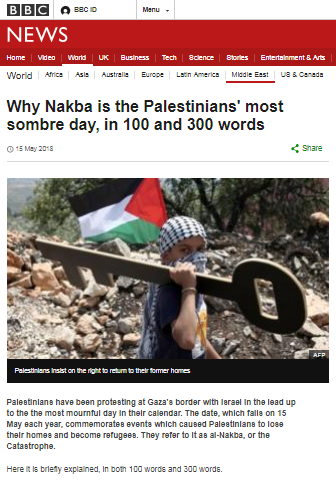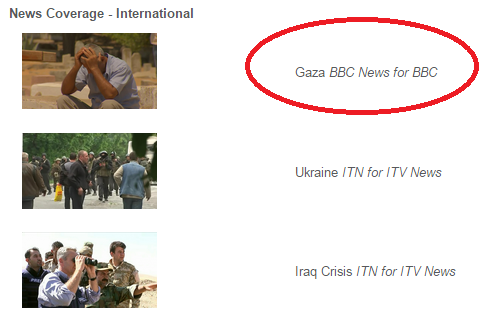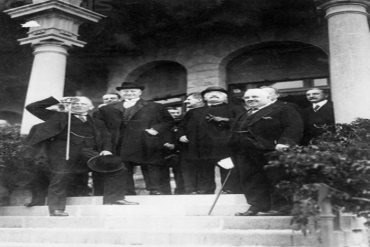BBC audiences recently saw heavy social media promotion of a programme in the ‘Our World’ series that was broadcast on the BBC News Channel and the BBC World News Channel under the title “Working for the Enemy”.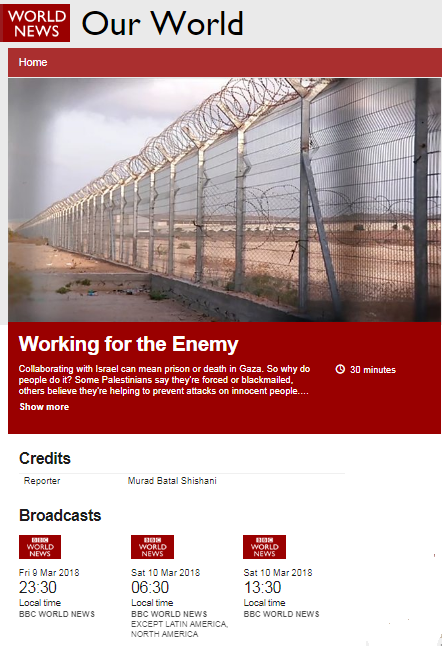
“Collaborating with Israel can mean prison or death in Gaza. So why do people do it? Some Palestinians say they’re forced or blackmailed, others believe they’re helping to prevent attacks on innocent people. Israel says recruiting Palestinian agents helps protect its citizens. For Our World, BBC Arabic’s Murad Batal Shishani travels to Israel, and Gaza, to unravel a complex web of desperation and exploitation.”
The ‘documentary’ presented by Murad Batal Shishani (available here) literally opened with a context-free slur that has long been used by anti-Israel campaigners and BBC journalists alike.
Shishani: “It’s been called the world’s largest open prison. The Gaza Strip: penned in by walls, barbed wire and gun turrets. The 1.8 million people living here can only get into Israel with special permission. And even if their lives depend on it, they have to enter through here – the Erez Crossing – the main gateway into Israel. […] This is the story of the desperate choices people have to make. […] It’s the story of how the Israeli state seeks to protect its citizens. […] And of those who now live tortured by shame and regret. […] This is a film about Palestinians who collaborate with the Israeli state: those who work for the enemy.”
Following that introduction, the next four minutes of the film repeatedly and uncritically promoted clips from a video produced by a terrorist organisation.
Shishani: “In May 2017 the ruling Hamas government in Gaza released this video to a shocked public. Some Palestinian men had apparently been caught working for Israel in Gaza. They were explaining how they were recruited. […] Each had been cleverly targeted according to their needs and beliefs. They were then recruited by Israeli agents to kill a senior leader of the Hamas military wing – a man called Mazen Fuqaha.”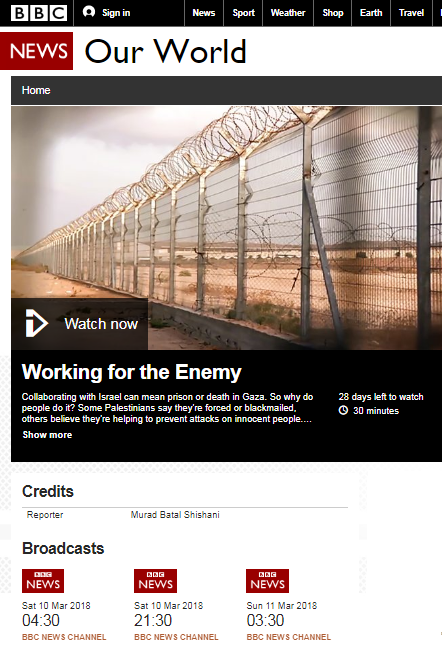
As readers may recall when Mazen Fuqaha was assassinated in March 2017, the BBC did not cover the story in English. Hamas immediately blamed Israel for the killing, at one point claiming that the assassins had arrived by sea. The BBC’s English language services also showed no interest in reporting border closures imposed by Hamas following the killing.
In April 2017 the BBC News website correctly reported that “Hamas has offered no evidence that Israel was behind Fuqaha’s death”. In May 2017 the BBC News website reported the executions of three men said by Hamas to have confessed to killing Fuqaha, quoting criticism of the process from an NGO.
“Human rights groups had called on the Islamist movement not to carry out the executions – just two weeks after it announced the arrests and aired videos of what it said were the men’s confessions. […]
Sarah Leah Whitson, executive director of the Middle East division of Human Rights Watch, said: “Rushing to put men to death based on an unreviewable decision of a special military court days after announcing their arrests, and airing videoed confessions, smacks of militia rule, not the rule of law.
“Reliance on confessions, in a system where coercion, torture and deprivation of detainee’s rights are prevalent, and other apparent due process violations further taint the court’s verdicts”.”
Nevertheless, BBC Arabic chose to take those video confessions at face value and after a brief sketch of Fuqaha’s terrorist activities during the second Intifada, his imprisonment and his release, Shishani interviewed Hamas’ Mahmoud al Zahar, describing him as someone who “had known Mazen Fuqaha for years”.
Zahar: “They [Israel] thought Fuqaha was active in the West Bank while based in Gaza. Either some Palestinian told them or they had some intelligence.”
Shishani: “And was he active?”
Zahar: “I don’t know.”
Showing no further interest in the topic of Fuqaha’s terrorist activities, Shishani went on to further amplify Hamas’ version of events.
Shishani: “But someone seemed to think Fuqaha was still active. On the 24th of March 2017 this man – Ashraf Abu Leila – received his instructions. He outlined the plan in the Hamas confession video. Hamas officials say that this is Ashraf, caught on CCTV as he walks past the hospital into the yard and towards his target’s parking lot. Fuqaha had spent a family day on the beach. He was alone in his car. The gunman followed him, knocked on his window and shot him five times. Ashraf’s job was done. Hamas had lost one of its key assets and there was an outpouring of grief at Fuqaha’s funeral. Soon after, Ashraf and his suspected accomplices were arrested. In their confessions they warned their audience not to fall for Israeli recruiters. Days after these confessions were filmed all three men were executed as traitors – and as a warning to others.”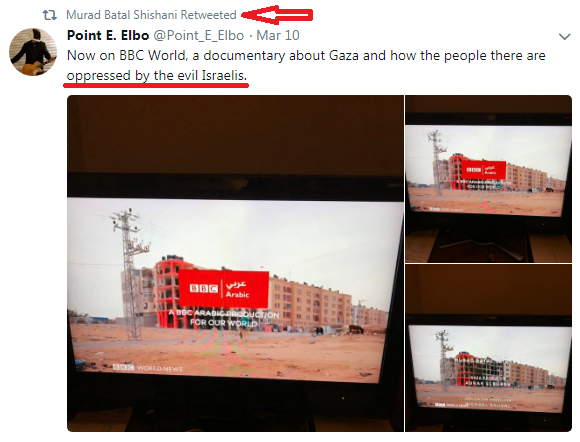
Then – after having spent a full four minutes unquestioningly amplifying Hamas’ unproven version of the story – Shishani told viewers that:
Shishani: “We cannot verify the testimonies in the video. Hamas would not share their evidence. But collaborating with Israel is not such a rare thing here.”
With obvious approval and cooperation from Hamas, Shishani next visited a prison in the Gaza Strip where he spoke to one of the “convicted collaborators” called Ibrahim. BBC audiences were once again led towards the erroneous belief that Gaza is under “siege”.
Ibrahim: “Most people who fall into this trap, 90% or more are victims. We in Gaza are suffering from a very harsh siege. Everything is in short supply. Healthcare. Basic needs.
Shishani: “Ibrahim told me that Israeli recruiters prey on the needs of people in Gaza.”
Ibrahim: “They target young men with financial problems and put pressure on them. To start with they say they are not asking for anything serious, just a chat. And then you fall into a bigger trap.”
Shishani: “Who are they targeting?”
Ibrahim: “Firstly it’s those who need medical treatment. This is the biggest problem facing us all. Everyone suffers from this problem. Secondly, it’s people with financial problems and thirdly those who are vulnerable and they turn to drugs.”
Once again – after giving uncritical and extensive amplification to those claims – Shishani ticked the BBC’s ‘impartiality’ box with a one-liner.
Shishani: “The Israeli authorities told us they don’t try to recruit people in these vulnerable situations.”
The next part of Shishani’s film was devoted to the man executed by Hamas for the killing of Mazen Fuqaha – Ashraf Abu Laila.
Shishani: “What could have made a Palestinian like Ashraf kill a leading Hamas militant? And how might the Israeli security forces have found and recruited such a man?”
Quoting an unidentified source described as a “jihadi” – presumably one of Gaza’s Salafists – Shishani told viewers:
Shishani: “Ashraf Abu Laila approached the jihadists, claiming he is a member of the so-called Islamic State but the jihadists rejected him. As a loner, Ashraf might have been easier to control. But would the Israeli security forces really recruit a jihadi – someone dedicated to the violent destruction of Israel? It seemed an extraordinary risk”.
The rest of this programme will be discussed in part two of this post.
Related Articles:
BBC Arabic inaccurately portrays 2002 terror attack victims
BBC Watch secures another correction to a BBC Arabic article
A Gaza border closure not deemed newsworthy by BBC News


